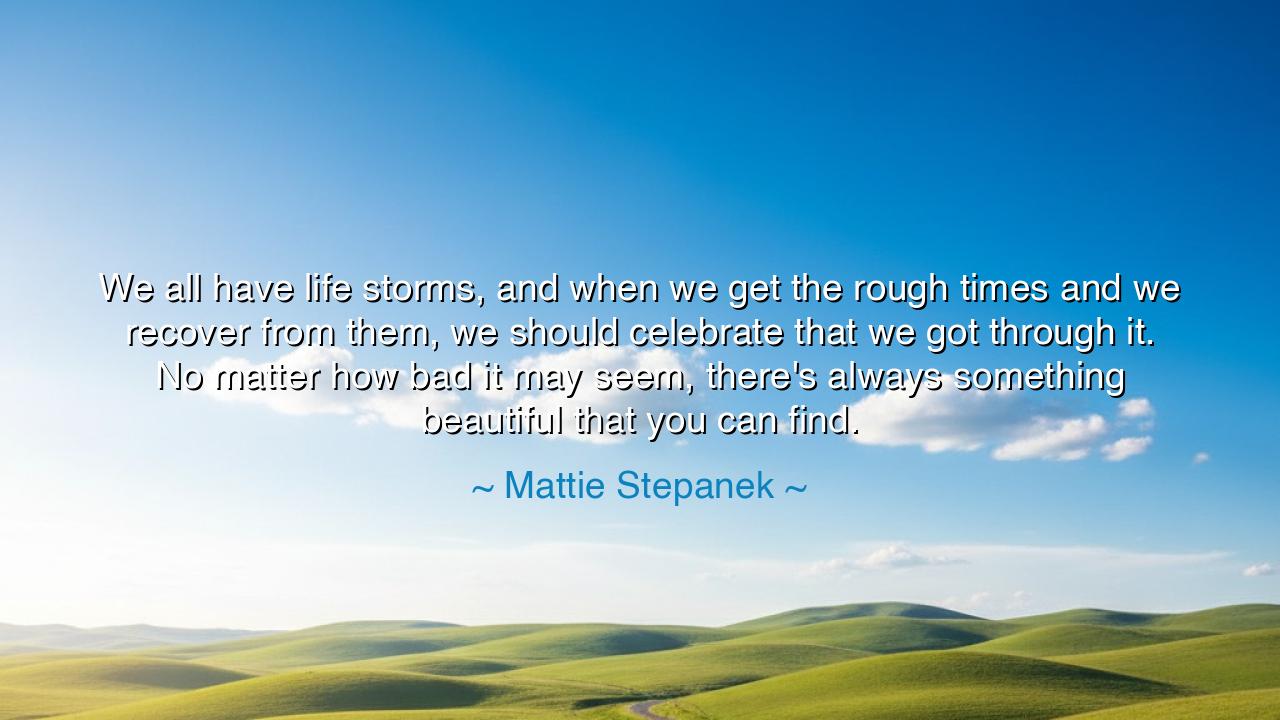
We all have life storms, and when we get the rough times and we
We all have life storms, and when we get the rough times and we recover from them, we should celebrate that we got through it. No matter how bad it may seem, there's always something beautiful that you can find.






"We all have life storms, and when we get the rough times and we recover from them, we should celebrate that we got through it. No matter how bad it may seem, there's always something beautiful that you can find." These profound words from Mattie Stepanek speak to the heart of human resilience and the potential for growth amidst adversity. Stepanek, whose life was marked by personal suffering and physical illness, reminds us that even in our darkest moments, there is something to be celebrated—strength, perseverance, and the discovery of beauty in the face of hardship. His message is not just a call to endure but to embrace the transformative power of overcoming life’s most difficult challenges.
The ancients knew this wisdom well. The Greek philosophers, particularly Aristotle, understood that virtue is forged in the crucible of adversity. For Aristotle, the true measure of a person’s character was not seen in times of comfort, but in how they responded to suffering and misfortune. He believed that courage and resilience were vital components of a virtuous life—qualities that could only be realized through struggle. In his work, Aristotle emphasized that the path to greatness is never smooth and that only by overcoming storms could one fully appreciate the joy of peace and contentment. Stepanek’s words echo this ancient understanding, suggesting that the celebration of life’s struggles is as vital as the celebration of its triumphs.
Similarly, the Stoics, like Epictetus and Marcus Aurelius, taught that life’s storms are inevitable and cannot be avoided. In fact, they saw suffering as a necessary part of the human condition, a path to self-realization and inner peace. Epictetus famously said, “It’s not what happens to you, but how you react to it that matters.” The Stoics did not preach the avoidance of hardship but rather the acceptance of it with grace and wisdom. By choosing how we respond to life's storms, we can transform them into opportunities for growth and find beauty in the most unlikely places.
One of the most compelling real-life examples of resilience in the face of hardship is the story of Helen Keller, who was born deaf and blind. Despite these immense challenges, Keller became a beacon of strength and wisdom, inspiring generations with her writings and activism. Her life was marked by suffering, but she did not see herself as defined by her limitations. Instead, she celebrated her ability to overcome them and found beauty in the world around her. Keller once said, “Although the world is full of suffering, it is also full of the overcoming of it.” Her ability to find light amidst darkness embodies the very essence of Stepanek’s message: that in times of difficulty, we should celebrate our strength and seek out the beauty that remains.
The story of Mahatma Gandhi provides another example of this principle. Gandhi, throughout his life, endured great personal and political storms—whether in his battle against British colonialism or the hardships he faced during his numerous imprisonments. Yet, despite facing overwhelming odds, Gandhi never wavered in his commitment to nonviolent resistance and peace. His ability to remain steadfast in his beliefs and to find purpose in suffering led to the eventual success of the Indian independence movement. His life was a testament to the idea that storms, whether personal or political, can shape us into stronger, more purposeful individuals. In every struggle, there is a deeper meaning to be found, and it is that meaning that allows us to move forward with hope.
The lesson from Stepanek’s quote and these historical examples is clear: life’s storms are inevitable, but how we choose to respond to them defines who we are. Resilience is not about avoiding hardship but about embracing it, learning from it, and finding the beauty and strength within it. The trials we face are not mere obstacles; they are the forges in which our character is molded. The real triumph lies not in escaping suffering but in enduring it and emerging from it with a greater sense of purpose and clarity.
In our own lives, we must cultivate this resilience by embracing life’s challenges and viewing them as opportunities for growth. When we face adversity, rather than becoming overwhelmed, we can choose to reflect on what can be learned from the experience and seek the beauty that often hides within our struggles. Like Helen Keller, we can find light even in the darkest of times. Like Gandhi, we can persist in the face of oppression, knowing that change often begins in the heart of adversity. Let us celebrate the strength we find in our struggles and understand that every storm we weather leaves us stronger, more resilient, and better equipped to embrace life’s beauty.






AAdministratorAdministrator
Welcome, honored guests. Please leave a comment, we will respond soon